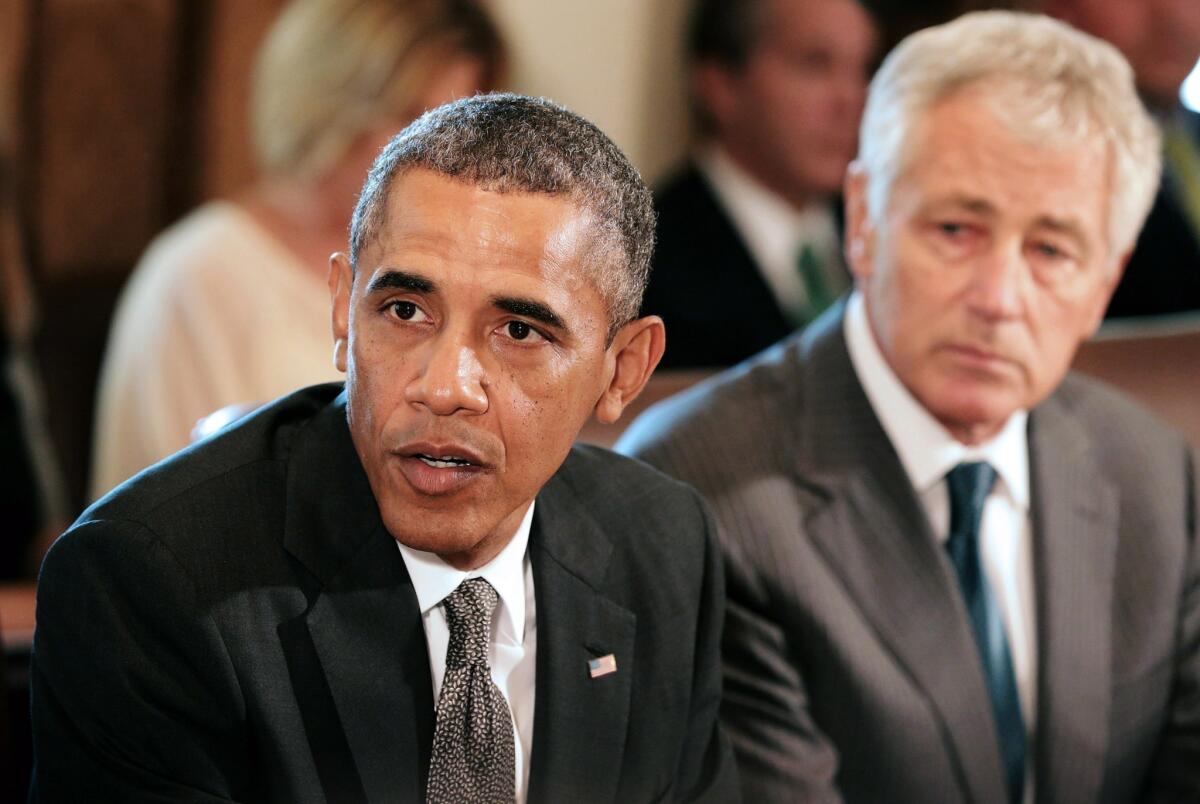On foreign policy, a consistently inconsistent president

- Share via
In the wake of his dizzying reverses over chemical weapons in Syria, President Obama has been blasted as inconsistent, impulsive and amateurish in his conduct of foreign policy. But when you look at his actions rather than his words, there’s more consistency than meets the eye. Consider the evidence.
In 2009, when Iranians rose in rebellion against the mullahs in Tehran, Obama gave their ill-fated “Green Revolution” rhetorical support. But he also went on negotiating with the Tehran government, because his first priority was making a deal over Iran’s nuclear program.
In 2011, when Egyptians rebelled, Obama gave that uprising rhetorical support too, and even urged Hosni Mubarak to step down. But he maintained a strong relationship with the Egyptian military, because his first priority was keeping peace with Israel.
Later that year, when Syrians revolted, Obama gave the rebels more rhetorical support and declared that Bashar Assad had to go. But he balked at sending the rebels military aid, and this month, he made a deal that could help Assad stay in power, because Obama’s first priority was eliminating chemical weapons.
What’s the common thread? That Obama’s rhetoric tends to outrun his willingness to use U.S. power, and that’s a problem, because it can lead to dangerous misunderstandings.
He often sounds like his United Nations ambassador, Samantha Power, who has championed the idea of “humanitarian intervention.” But he more often acts like Brent Scowcroft, the advisor to Presidents Ford and George H.W. Bush who criticized the 2003 Iraq invasion and warned against unnecessary entanglements abroad.
Obama may like the idea of promoting democracy, but his first priority has been reducing U.S. commitments around the world, especially in the Middle East. He has launched significant military action only in the service of more traditional national security interests — mainly battling Al Qaeda.
There’s one exception to that rule: the 2011 war in Libya, when the United States joined an international coalition to topple Moammar Kadafi. In that case, Kadafi’s forces were weak, the action had been explicitly authorized by the U.N. Security Council and Britain and France had promised to take the lead.
The effort turned out to be harder than it looked, however, and U.S. forces shouldered a bigger share of the burden than Obama had wanted. A year later, with the country still in chaos, terrorists killed the U.S. ambassador in Benghazi. The experience only reinforced Obama’s skepticism about military intervention.
Since then, the president has returned to resisting new military commitments abroad, but his rhetoric has remained ambitious and idealistic. And in the case of Syria, that gap turned into a self-constructed trap for Obama.
The president dismissed criticism of his sudden reversals over Syria — saying he would order military strikes, then saying he would seek approval from Congress, then switching to diplomacy instead — as mere “style points.”
“Folks here in Washington like to grade on style,” he said in an interview with ABC News. “Had we rolled out something that was very smooth and disciplined and linear, they would have graded it well, even if it was a disastrous policy.... I’m less concerned about style points; I’m much more concerned about getting the policy right.”
But there was more at stake than mere style. Obama’s reversals made it difficult for anyone — allies and adversaries alike — to know what he might do next.
Most of the time, that’s a defect in a foreign policy, because it shakes allies’ confidence and makes it easier for adversaries to misjudge our intentions.
“He’s caught between his own rhetoric about American leadership — rhetoric that’s obligatory in much of the foreign policy establishment — and the reality of what the American public is willing to pay for,” said Michael Mandelbaum, a foreign policy scholar at Johns Hopkins University.
Obama still hasn’t quite reconciled the two faces of his policy for American voters or anyone else, including Syria’s disappointed rebels and Iran’s ruling clergy.
And that leaves a lot of room for misunderstanding. In the case of Iran, Obama wants the mullahs to believe that if they cross his “red line” of building a nuclear weapon, they will face a U.S. military strike — unlike Syria’s Assad, who crossed Obama’s “red line” with chemical weapons but was spared.
The president says the distinction is perfectly clear.
“I think what the Iranians understand is that the nuclear issue is a far larger issue for us than the chemical weapons issue,” he said. “They shouldn’t draw a lesson that … we won’t strike Iran.” Instead, he suggested, “what they should draw from this lesson is that there is the potential of resolving these issues diplomatically.”
Let’s hope the mullahs can decipher the message.
Twitter: @DoyleMcManus
More to Read
A cure for the common opinion
Get thought-provoking perspectives with our weekly newsletter.
You may occasionally receive promotional content from the Los Angeles Times.










